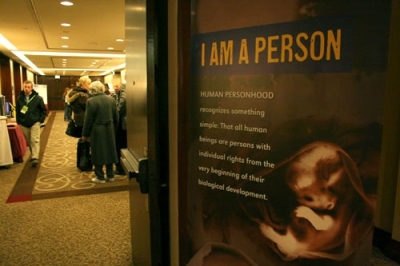Roe v. Wade: Personhood gives the game away

California isn't Mississippi, John Kerry isn't Mike Pence, and Justice Blackmun was no pro-lifer. So, what do they all have in common when it comes to the battle over abortion? Indirectly acknowledging that the crux of the debate is not “choice” or “privacy” or “viability” or “control over a woman’s body,” but the single issue of personhood. You can abort a fetus, terminate a pregnancy, even “evacuate a pregnancy,” but everybody knows you can’t just kill anyone you wish didn’t exist! Killing a person is homicide. So, is a fetus not a person…?
Take the case of the enraged husband who kicked his estranged wife in the abdomen when he saw her “lump,” confirming the rumor that she was pregnant by a lover. The baby was delivered stillborn, triggering an unsuccessful prosecution for murder, prompting an outcry leading to a change in the wording of the murder statute. Not in Mississippi, but in California! §187 now defines murder as “the unlawful killing of a human being, or a fetus, with malice aforethought.”
For now, at least, abortion is a recognized exception, but note the obvious equivalence between a “human being” and a “fetus” in terms of the personhood being protected. (As subsequently decided, even a non-viable fetus; and, in other states, “from the moment of fertilization.”) Add to that more and more civil actions for wrongful death where the fetus is negligently killed, as in an auto accident.
So, what is my point? In both criminal and civil law, the personhood of the unborn is being legally recognized and protected against everyone in the entire world…except the mother.
So now playback the words of Justice Blackmun in Roe: “If this suggestion of personhood is established…the fetus’ right to life would be guaranteed specifically by the [14th] Amendment.” What a concession, given that this all-important fetal personhood has now been definitively established! Consider, most especially, the 2004 Unborn Victims of Violence Act (protecting the unborn from murder and assault in federal cases) which defines a “child in utero” as “a member of the species Homo sapiens, at any stage of development, who is carried in the womb.”
The implication was not lost on liberal icon John Kerry, who complained: “I have serious concerns about this legislation because the law cannot simultaneously provide that a fetus is a human being and protect the right of the mother to choose to terminate her pregnancy.” Bingo! No “choice,” “right of privacy,” or “control over a person’s body” can change what’s blindingly obvious to even the staunchest of pro-choice advocates like John Kerry: Legally-recognized personhood precludes any supposed right to abortion.
To the extent that “viability” was supposed to be a safe dividing line, consider two inevitable back-to-back days — one on which the non-viable fetus is not a person, then only 24 hours later (now viable) having legally-protected personhood. (That line being all the more artificial as medical advances have pushed back those two decisive days earlier and earlier in the pregnancy.)
Roe’s vulnerability is in the blatant inconsistency of current law. How can it be that, if a mother wants her baby, then it is a person, and the law will protect it against the world; but if a mother doesn’t want the baby, then it’s not a person, and the mother can do with it as she pleases? With the legal contradiction now fully exposed, not even individual states can legalize abortion. As Blackmun reminds us, personhood is constitutionally protected under the 14th. Period!
F. LaGard Smith is a retired law school professor (principally at Pepperdine University), and is the author of some 35 books, touching on law, faith, and social issues. He is the compiler and narrator of The Daily Bible (the NIV and NLT arranged in chronological order).




























